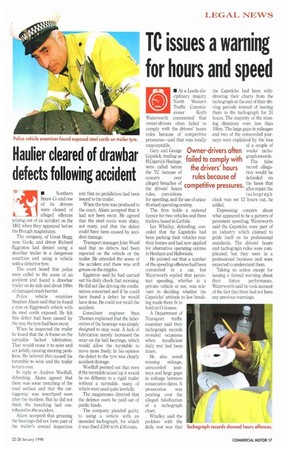IC issues a warning for hours and speed
Page 19

If you've noticed an error in this article please click here to report it so we can fix it.
• At a Leeds disciplinary inquiry North Western Traffic Commis sioner Keith Waterworth commented that owner-drivers often failed to comply with the drivers' hours rules because of competitive pressures—and that was totally unacceptable.
Gary and George Capstick, trading as H Capstick Haulage, were called before the TC because of concern over alleged breaches of the drivers' hours rules, convictions for speeding, and the use of unauthorised operating centres.
The firm holds a national licence for two vehicles and three trailers, based in Carlisle.
Ian Whalley, defending, conceded that the Capsticks had been parking their vehicles near their homes and had now applied for alternative operating centres in Hexham and Haltwistle.
He pointed out that a number of the speeding offences had been committed in a car, but Waterworth replied that persistent speeding, whether in a private vehicle or not, was relevant in deciding whether the Capsticks' attitude to law breaking made them fit to hold an 0-licence.
A Department of Transport traffic examiner said their tachograph records revealed occasions when insufficient daily rest had been taken.
He also noted missing mileage, unrecorded journeys and large gaps in mileage between consecutive dates. A prosecution was pending over the alleged falsification of a tachograph chart.
Whalley said the problem with the daily rest was that the Capsticks had been withdrawing their charts from the tachograph at the end of their driving periods instead of leaving them in the tachograph for 24 hours. The majority of the missing distances were less than 10km. The large gaps in mileages and two of the unrecorded journeys were explained by the loss of a couple of weeks' tachograph records.
The false record allegation would be defended on the basis that after repair the tachograph clock was set 12 hours out, he added.
Expressing concern about what appeared to be a pattern of persistent speeding, Waterworth said the Capsticks were part of an industry which claimed to pride itself on its professional standards. The drivers' hours and tachograph rules were complicated, but they were in a professional business and were expected to understand them.
Taking no action except for issuing a formal warning about their future performance, Waterworth said he took account of the fact that there had not been any previous warnings.
Owner-drivers often failed to comply with the drivers' hours rules because of competitive pressures.






































































































